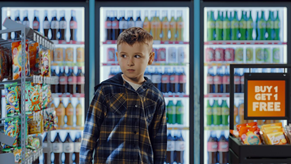Is vegan food safe for people with food hypersensitivities?
Vegan does not mean allergen-free so always treat vegan food as if it was any other food. If you have an intolerance or allergy check labels and ingredients.
If you have a food hypersensitivity (food allergy or food intolerance), you should treat vegan food the same way you treat all food, by checking that it doesn’t contain the allergen(s) you need to avoid either as an ingredient or a contaminant. Here is some general advice on food allergies and food intolerances.
Always remember: Vegan does NOT mean allergen-free. It means food that is not made from ingredients derived from animals.
What allergens could be in vegan food?
Regulated allergens should be highlighted on food label ingredients list if they are used as ingredients. Nine are plant based - mustard, soy, gluten, nuts, peanuts, celery, sesame, lupin and sulphur. Other allergens – eggs, fish, milk, crustaceans and molluscs – are animal based and should not be used in vegan foods.
For any food allergen, there is always the chance it could get into the food as a contaminant during manufacturing or handling. Check the product label for any statements such as ‘May contain traces of milk’ or ‘May contain soya’. Because vegan food is not produced with food allergic or food intolerant customers in mind, you need to take these statements seriously.
What about unregulated food allergens?
All other food allergens – like beef, chicken, peas/legumes, citrus - are not subject to the allergen labelling laws so are not required to be highlighted on food labels.
If you have an allergy or intolerance to a food of animal or plant origin not covered by the allergen labelling laws, then you should carefully check the ingredients list and also see if there is any indication that the allergen could be present as a contaminant.
Is there a difference in food labelling between food manufacturing and catering?
For all packaged food products, including those marketed as vegan, the manufacturer has the option of putting a precautionary allergen statement on the label if they think there is a chance of contamination with a food allergen.
However, the option of using precautionary allergen statements is not open to caterers. So don’t assume that ‘vegan’ automatically means ‘allergen-free’. Always ask a server or manager/chef if there is a chance for contamination with the allergen you are trying to avoid. If they are unsure, then it’s best to not take a chance.
Is there a nutritional risk to vegans if they have a food allergy or food intolerance?
This depends on the dietary restrictions due to their food allergy or intolerance. If you are thinking of starting a vegan or vegetarian diet and you have a food allergen or intolerance, then talk to your doctor or a registered dietitian to check if it involves any nutritional risks.
What is ‘free from’ food?
‘Free from’ is a claim on a food product stating that it doesn’t contain a certain ingredient. Examples include diary free, free-from sulphites, meat free, sugar free, fat free, and lactose free.
‘Free from’ claims are voluntary, so a food manufacturer can choose to use them. Gluten free products mean the amount of gluten must be below a certain level or threshold. Other ‘free from’ claims must contain no trace of that ingredient.
Is vegan food another kind of ‘free-from’ food?
‘Vegan’ and ‘free from’ are separate claims, but both are voluntary and give information on the composition of the food. Vegan claims are aimed at people following a vegan diet, while ‘free from’ claims are aimed at those who want to avoid specific food ingredients or a type of food. ‘Free from’ claims, and not vegan claims, can be used by customers as food safety information. This is particularly true for people with food allergy or intolerance who regard allergen-free claims on food packaging as an indication of safety. Vegan food claims are not food safety information and should not be used as such.




